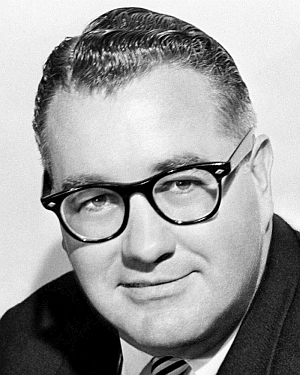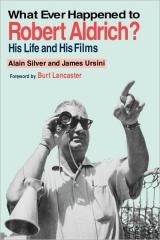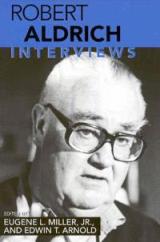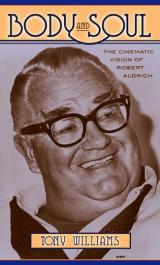| Robert ALDRICH |
 * 09.08.1918, Cranston, Rhode Island, USA † 05.12.1983,
Los Angeles, USA * 09.08.1918, Cranston, Rhode Island, USA † 05.12.1983,
Los Angeles, USARegisseur, Produzent, Drehbuchautor * Studium der Wirtschaft an der University of Virginia * ab 1941 Produktionsassistent bei RKO * 1945-52 Regieassistent (von u.a. Lewis Milestone, William A. Wellman, Abraham Polonsky, Joseph Losey, Charles Chaplin) * 1951-52 production supervisor und associate producer (Ten Tall Men) * ab 1952 schreibt und inszeniert einige Folgen der TV-Serien The Doctor und China Smith * 1953 erster Kinofilm (Big Leaguer) * 1953 Beginn einer langjährigen erfolgreichen Zusammenarbeit mit dem Kameramann Joseph Biroc * Gründung der Produktionsfirmen Associates and Aldrich (1954) und (zusammen mit Burt Reynolds) Roburt Company (1975) * großer finanzieller Erfolg mit The Dirty Dozen (1966) * 1975-79 Präsident der Directors Guild of America | Bild: Porträt (?) |
| FILMS |
Big Leaguer (1953-USA; R: Robert Aldrich, B: Herbert Baker, K: William C. Mellor, ML: Alberto Colombo, D: Edward G. Robinson, Vera-Ellen) 70m-Sportdrama (02-03; 5308) World for Ransom (Menschenraub in Singapur, 1953-USA; R: Robert Aldrich, B: Lindsay Hardy [for Hugo Butler], K: Joseph Biroc, M: Frank De Vol, D: Dan Duryea, Gene Lockhart, Patric Knowles) 82m-Thriller (04 > 11 Tage; 5401) Apache (1953-USA) (Roman von Paul Wellman) (5407) Vera Cruz (1954-USA) (5501) Kiss Me Deadly (1954-USA) (Roman von Mickey Spillane) (5505) The Big Knife (1955-USA) (5511) Autumn Leaves (1955-USA) (5609) Attack (1956-USA) (5610) Ten Seconds to Hell (1958-GB) (Roman von Lawrence P. Bachmann) (5906-D) The Angry Hills (1958-GB) (Roman von Leon Uris) (5901-BBFC) The Last Sunset (1960-USA) (Roman von Howard Rigsby) (6106) Sodoma e Gomorra (1961-I/F) (6210) What Ever Happened to Baby Jane? (1962-USA) (Roman von Henry Farrell) (6210) 4 for Texas (1963-USA) (6312) Hush...Hush, Sweet Charlotte (1964-USA) (Roman von Henry Farrell) (6412) The Flight of the Phoenix (1965-USA) (Roman von Elleston Trevor) (6512) The Dirty Dozen (1966-USA) (Roman von E.M. Nathanson) (6706) The Legend of Lylah Clare (1967-USA) (6808) The Killing of Sister George (Das Doppelleben der Sister George, 1968-USA; R: Robert Aldrich, B: Lukas Heller, K: Joseph Biroc, M: Gerald Fried, D: Beryl Reid ° Susannah York ° Coral Browne) 138m-Tragikomödie (Bühnenstück von Frank Marcus, 1965) (06-10; 6812) Too Late the Hero (Zu spät für Helden - Antreten zum Verrecken, 1969-USA; R: Robert Aldrich, B: Robert Aldrich, Lukas Heller, K: Joseph Biroc, M: Gerald Fried, D: Michael Caine, Cliff Robertson) 133m-Kriegsabenteuer (7005) The Grissom Gang (Die Grissom Bande, 1970-USA; R: Robert Aldrich, B: Leon Griffiths, K: Joseph Biroc, M: Gerald Fried, D: Kim Darby, Scott Wilson, Tony Musante, Robert Lansing) 127m-Thriller (Roman von James Hadley Chase) (7105) Ulzana's Raid (1972-USA) (7210) Emperor of the North Pole (1972-USA) (7305) The Longest Yard (1973-USA) (7408) Hustle (1974/75-USA) (7512) Twilight's Last Gleaming / Das Ultimatum (1976-USA/D) (Roman von Walter Wager) (7702) The Choirboys (Die Chorknaben, 1977-USA; R: Robert Aldrich, B: Christopher Knopf, K: Joseph Biroc, M: Frank De Vol, D: Charles Durning ° Louis Gossett, Jr. ° Perry King ° Clyde Kusatsu ° Stephen Macht ° Tim McIntire ° Randy Quaid ° Chuck Sacci ° Don Stroud ° James Woods ° Burt Young, Robert Webber) 120m-Tragikomödie (Roman von Joseph Wambaugh, 1975) (03-06; 7712) The Frisco Kid (Ein Rabbi im Wilden Westen, 1978/79-USA; R: Robert Aldrich, B: Michael Elias, Frank Shaw, K: Robert B. Hauser, M: Frank De Vol, D: Gene Wilder, Harrison Ford) 122m-Westernkomödie (7907) ...All the Marbles (Kesse Bienen auf der Matte, 1980/81-USA; R: Robert Aldrich, B: Mel Frohman, K: Joseph Biroc, M: Frank De Vol, D: Peter Falk, Vicki Frederick) 113m-Tragikomödie (8110) |
| AWARDS |
Silberner Löwe für The Big Knife [Filmfestspiele Venedig 1955] Silberner Bär (beste Regie) für Autumn Leaves [Berlinale 1956] |
| BOOKS |
"There was something about Robert Aldrich's artistic temperament that enabled him to transcend the apparent vulgarity of so many of his motion picutres. Besides the great films, such as Kiss Me Deadly which is certainly one of the finest examples of film noir, are several little-seen or underrated later works such as the revisionist Western, Ulzana's Raid, the gangster love story, The Grissom Gang, or the grim cop picture, Hustle. Aldrich's career has long deserved the detailed evaluation which this book provides." - Andrew Sarris > 390 pages |
In this collection of interviews, Robert Aldrich (1918-1983) tells fascinating stories of making motion pictures with such film legends as Burt Lancaster, Lee Marvin, Jack Palance, Robert Mitchum, Bette Davis, Joan Crawford, James Stewart, Charles Bronson, Eddie Albert, and Burt Reynolds. As he speaks of them, of his on-going battles with censors, and of his audacious but failed attempt to create his own studio, he talks bluntly, sometimes ferociously, about struggling to make movies that accented his uncompromising view of life. Among Aldrich's interviewers are Richard Combs, Peter Bogdanovich, Alain Silver, Pierre Sauvage, and David Sterritt. In dialogue with these critics and film scholars he recounts a life in filmmaking that encompassed both old Hollywood's studio system and the spirited independence that took American cinema in a new direction in the 1960s and '70s. Although he was a member and a kinsman of wealthy, powerful families (the Aldriches of Rhode Island and the Rockefellers of New York), he gained a reputation as an anti-authoritarian maverick whose films condemned corruptive power. While succeeding as popular entertainment, they also were personal attacks on hypocrisy and intolerance. Aldrich redefined genres and undercut the conventions they portrayed. Kiss Me Deadly transformed the detective film into a satire on Cold War America. Vera Cruz disclosed the corruption at the heart of the traditional western. The Dirty Dozen and Twilight's Last Gleaming rendered the ambiguous underside of combat and the military. Whatever Happened to Baby Jane? and Hush . . . Hush, Sweet Charlotte shaped horror films into psychological studies of female loneliness and alienation. > 192 pp. |
Body and Soul explores the work of Robert Aldrich, a producer and director responsible for several notable films, including The Flight of the Phoenix, The Dirty Dozen, Too Late the Hero, The Longest Yard and Whatever Happened to Baby Jane? Author Tony Williams examines the relationship of Aldrich's films to the Cultural Front movement of the 1930s as well as to the blacklist of the 1950s. He also delineates Aldrich's attempts to follow the progressive ideals of such mentors as Jean Renoir, Lewis Milestone, and Charlie Chaplin. From the noir classic Kiss Me Deadly to the controversial thriller Twilight's Last Gleaming, Body and Soul focuses on the dilemmas — both personal and political — that affect individuals in all of Aldrich's films. > Table of Contents: Acknowledgments * Introduction * Chapter One: Odets and Aldrich * Chapter Two: Enterprise and After * Chapter Three: Television Work * Chapter Four: Apocalyptic Noir * Chapter Five: The Western Odyssey * Chapter Six: Melodrama, Authoritarianism, and Hysteria * Chapter Seven: The Private War of Robert Aldrich * Chapter Eight: The Game of Self-Respect * Chapter Nine: Twilight's Last Gleaming * Chapter Ten: Conclusion * Appendix: The Last Days of Sodom and Gomorrah * Filmography * Bibliography * Index * About the Author > paper(back), 392 pages |
| home © midas 04/2023 |
 Alain Silver, James Ursini:
Alain Silver, James Ursini: Eugene L. Miller, Edwin T. Arnold [Hg.]: Robert Aldrich: Interviews. Jackson: University Press of Mississippi, 2004
Eugene L. Miller, Edwin T. Arnold [Hg.]: Robert Aldrich: Interviews. Jackson: University Press of Mississippi, 2004 Tony Williams: Body and Soul: The Cinematic Vision of Robert Aldrich. Lanham/Oxford: Scarecrow Press, 2004
Tony Williams: Body and Soul: The Cinematic Vision of Robert Aldrich. Lanham/Oxford: Scarecrow Press, 2004